Alibaba NFT Marketplace: Positives, Negatives, and Alternatives
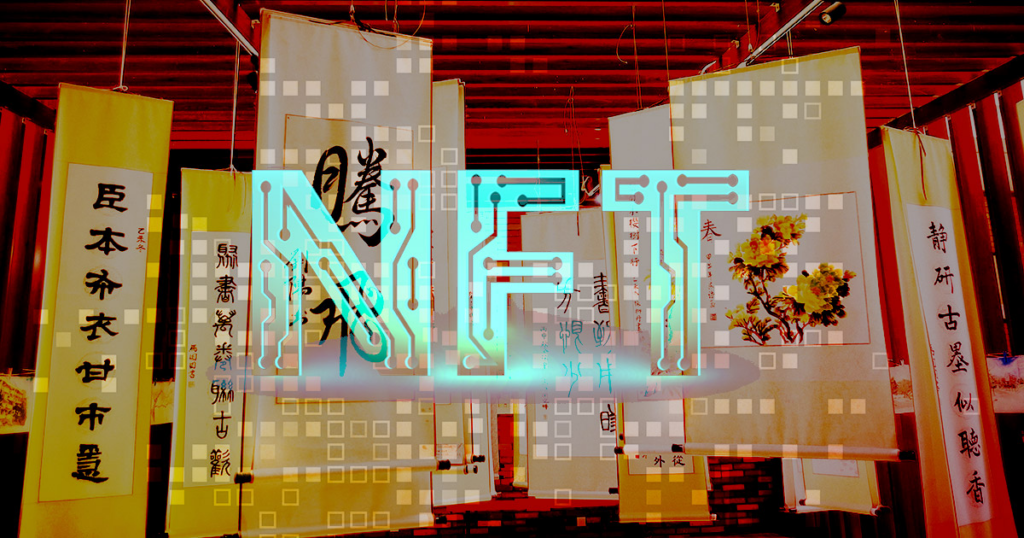
More and more Chinese companies have started actively investing in NFT projects, seeing them as promising growth areas. What is more, China is one of the top 4 countries in the use of NFTs. In this way, Alibaba, Tencent, and JD.com have already launched their blockchain art marketplaces. Chinese digital art platforms are very different from the rest. Let’s find out about their pros, cons, and peculiar features.
What Is an NFT Marketplace?
NFT marketplace is a platform where artists, musicians, designers, and writers can sell their works as non-fungible tokens. Investors come to marketplaces to buy unique assets that can be sold for higher prices within time. Corporations, celebrities, and brands integrate with marketplaces to launch their digital collections to attract clients and profit from new technologies.
Some sites are dedicated to a specific topic, such as gaming. Others allow you to create and sell all sorts of tokens, from paintings to virtual territories. Some platforms sell tickets, in-game items, and celebrities’ collections, while others sell different types of art.
The whole crypto market experienced a substantial decrease in 2022, and the market of NFTs saw a downfall of 83%. Still, as the crypto market is recovering in 2024, new investors and crypto enthusiasts have jumped into the NFT sector and started looking for new opportunities. As a result, this industry will likely experience a new wave of growth.
Chinese Digital Art
Although all cryptocurrency-related activities, including mining, trading, and crypto investment, have been outlawed in China, the NFT sector still thrives.
While all crypto exchanges are closed, and initial coin offers (ICOs) are prohibited, blockchain art marketplaces continue to work. Local auction houses and Chinese tech giants such as Alibaba and Tencent are stepping into the NFT sector by developing their Web3 ecosystems. They see the potential of new technologies and develop ways to use them in their businesses.
Moreover, several Chinese blockchain and technology companies have been making considerable investments in the NFT sector because they see them as promising areas for growth.
China is in 4th place by the number of people using non-fungible tokens, which shows extreme interest in this new technology.
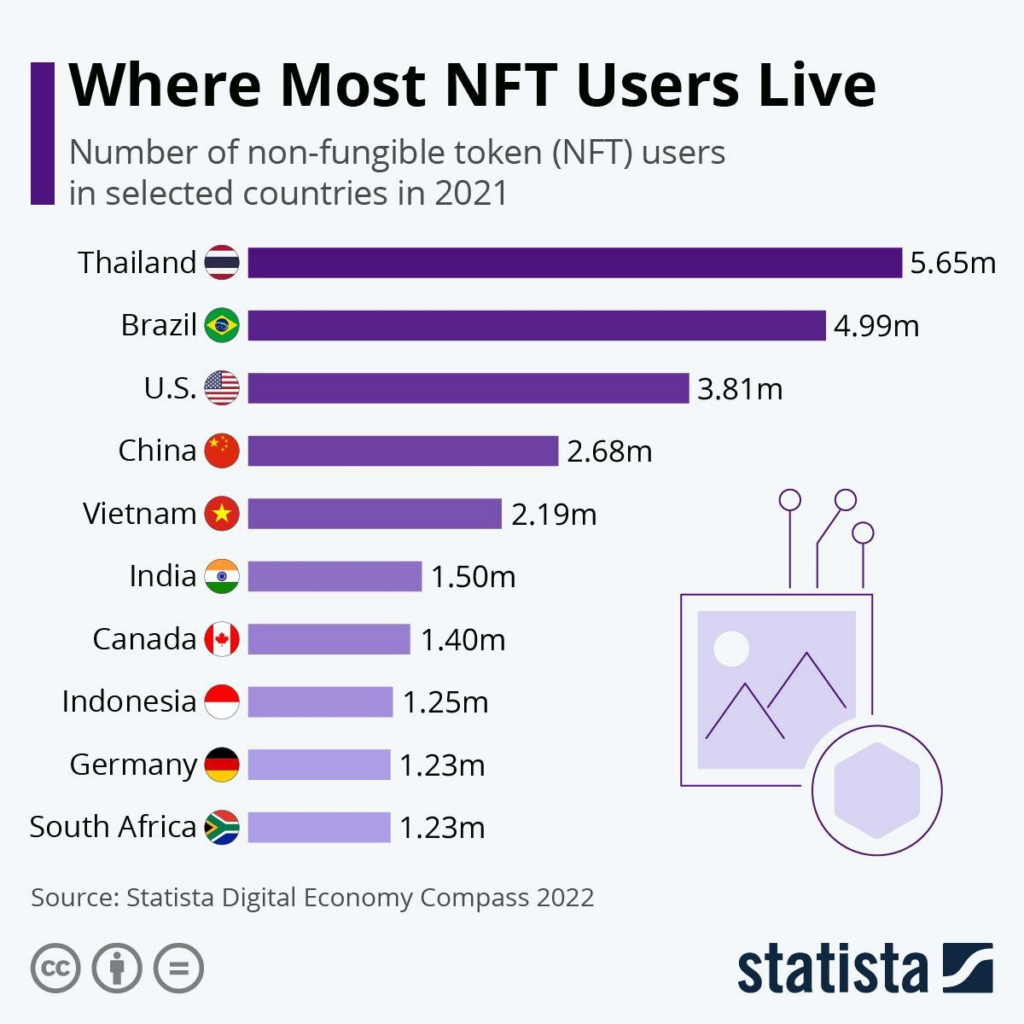
Chinese companies avoid using words like “token” and refer to them as “digital collectibles” to highlight that they are non-tradable and do not refer to cryptocurrencies. That’s why you can often see that Chinese marketplaces do not assume a secondary market. Furthermore, companies usually build private blockchains instead of public ones, such as Ethereum or Solana, as most NFT platforms do.
Alibaba NFT Marketplace
Alibaba is a Chinese global tech company focusing on e-commerce, retail, the Internet, and technologies. It tries to keep up with trends and always integrates new technologies. In such a way, the company has launched a blockchain game where players can get NFTs as a reward and has recently partnered with Mysten Labs to develop Web3 ecosystems and test potential opportunities in e-payment and commerce.
It also has caught the trend for digital collectibles marketplaces: in 2021, Alibaba launched an NFT platform, “Blockchain Digital Copyright and Asset-Trade,” allowing owners to sell their intellectual property rights.
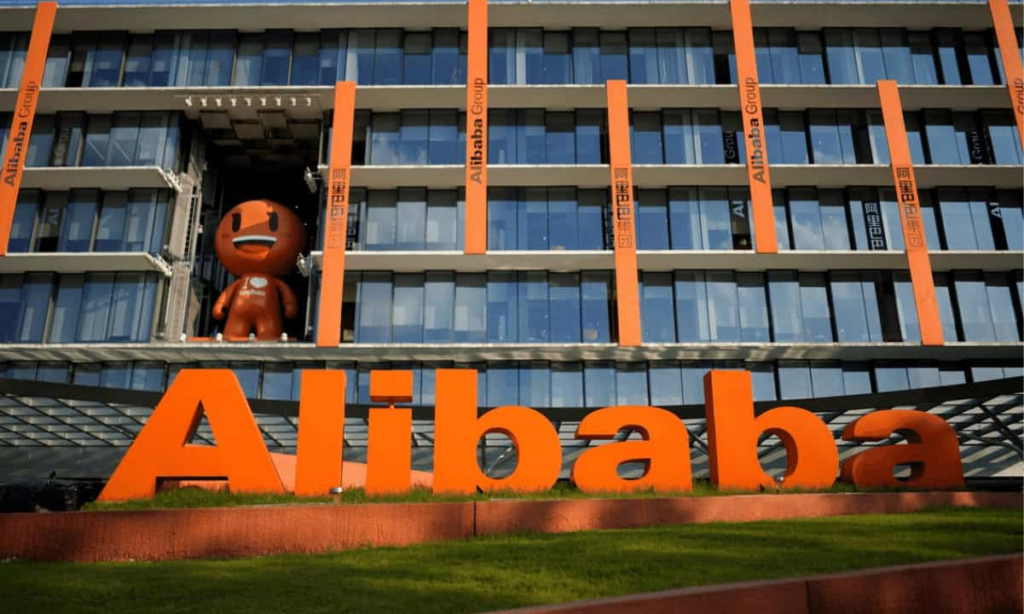
By placing a deposit of 500 Yuan, anybody can participate in auctions on the Alibaba blockchain art marketplace. The starting bid for each of the forthcoming auctions is $15.
If you are the highest bidder, you can view your purchased digital collectibles through Bit Universe, a crypto Portfolio application integrated into WeChat.
Positives
- The site can be accessed through the Alibaba auction platform. Buyers can view their collections through the Bit Universe app integrated into WeChat. In this way, even users unfamiliar with blockchain technology can start investing in Chinese digital art.
- The NFT service provided by Alibaba Cloud operates on a subscription basis. It is one of the most popular pricing models, so users are familiar with its work.
- Everything can be tokenized, including paintings, songs, videos, and books. The platform can offer various digital assets and attract different investors.
Negatives
- Сrypto is banned in China. Failure to stick to the legislation could cause penalties, cancellation of permissions or licenses, and even the closure of business. Alibaba Cloud’s CDN system has over 80 percent of the bumps placed in landmass China. As a result, the platform must be very cautious to avoid legal issues. Alibaba can’t integrate crypto into their NFT platform, so they have to use yuan.
- The technology itself still does not prevent unauthorized copying. Thus, anyone can still view or download a copy of the asset.
- Users cannot sell or transfer purchases. Like many other Chinese NFT marketplaces, Alibaba does not allow users to resell digital collectibles.
- No decentralization.
Alibaba NFT marketplace VS OpenSea
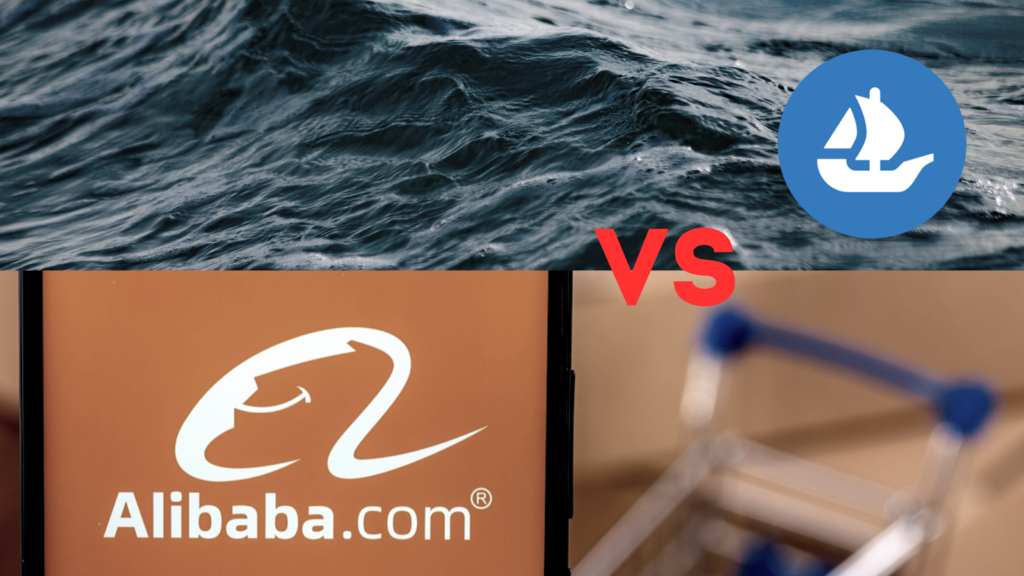
OpenSea is the most popular blockchain art marketplace, so let’s compare these two options to choose which platform to use.
Centralization
Alibaba’s blockchain art marketplace is centralized as the Sichuan Blockchain Association Copyright Committee operates it and is backed by the provincial government. Conversely, OpenSea is an entirely decentralized platform on different blockchains, including Ethereum, Polygon, Klaytn, and others.
Anonymity
Alibaba platform requires users to provide their real personal information. OpenSea allows users to preserve their anonymity.
Accessibility
Alibaba NFT marketplace doesn’t require a crypto wallet. Users must register on the Alibaba auction platform and have a WeChat account to view their collections. So users need to work only with familiar tools, which increases accessibility.
To access OpenSea, users must set up a crypto wallet and top it up with cryptocurrency. So before investing, people need to learn how to use crypto wallets and how to buy crypto.
Money
Alibaba NFT platform accepts only yuan as a means of payment. By comparison, OpenSea accepts different cryptocurrencies such as Ethereum, AVAX, and Matic.
Alibaba NFT marketplace Alternatives
1️⃣ Jingtan

Jingtan is another NFT platform owned by Alibaba. Again it is not decentralized, so owners can ban accounts of unwanted customers. Jingtan’s users can resale their digital collectibles on other markets such as XMeta, and other local social media platforms.
To meet the regulator’s requirements, Jingtan has 90 days lock period for NFTs transfers. Thus, an investor has to hold the digital collectible for at least 90 days before it can be transferred to another person. However, NFT trading is not allowed on the platform.
2️⃣ Lingxi

JD.com is one of the largest e-commerce companies in China, competing with other significant players in the market, such as Alibaba. The company is trying to keep up with its main competitor, so it has also released an NFT platform Lingxi, through which users can store, verify, and trace NFTs.
Like Alibaba’s marketplace, it also requires real data of its users, so the platform assumes no anonymity. Resale is also prohibited, but users can transfer digital collectibles to other parties for research, exhibition, appreciation, and collection purposes.
3️⃣ TheOne.Art
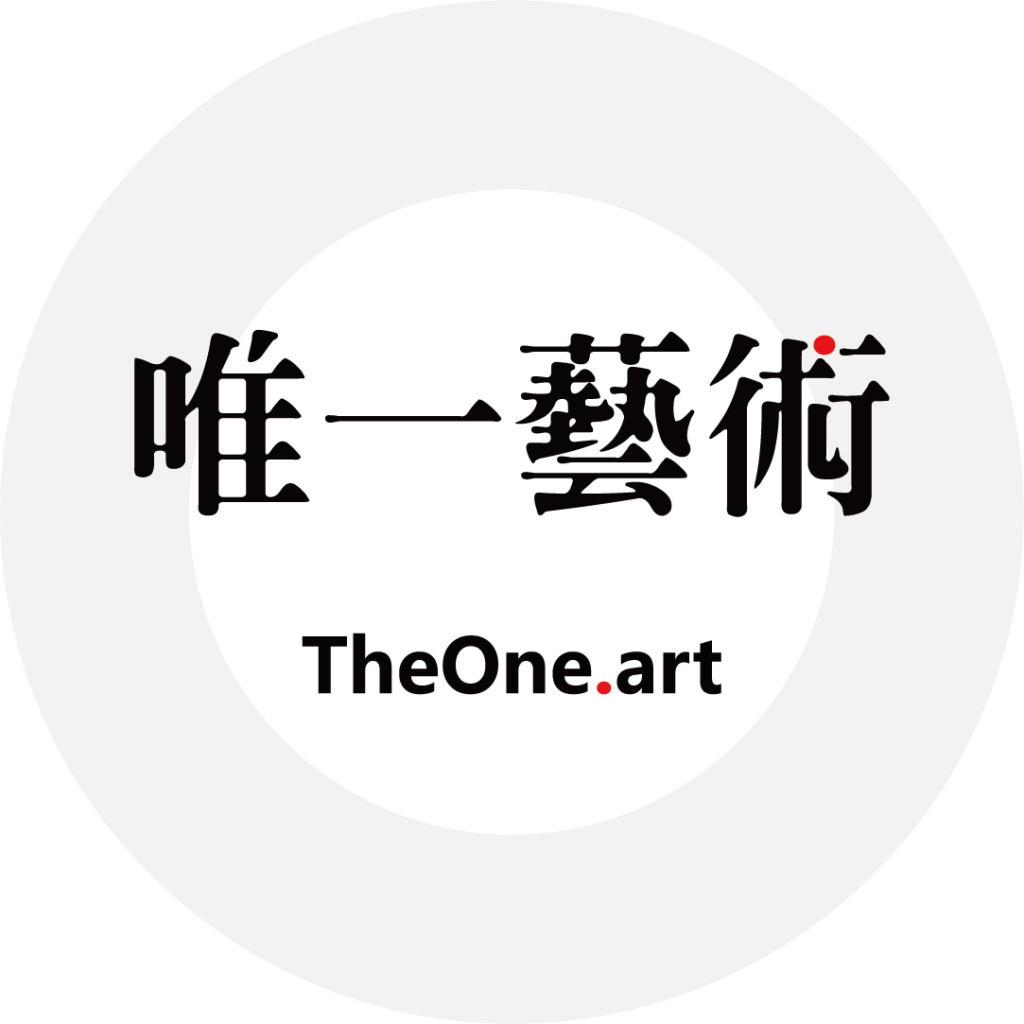
TheOne.art is one of the first Chinese blockchain art platforms. The platform became popular in 2021, attracting thousands of artists by organizing the world’s first digital art creation competition. Unlike most Chinese NFT marketplaces, it allows resales. Users can buy digital assets via different payment systems, including Yibao, Baofu, and Huiyuan.
4️⃣ NFTCN (Bigverse)

NFTCN (Bigverse) is a metaverse brand in the new era that integrates digital art innovation, metaverse space creation, and content ecological community creation. It allows users to mint, purchase and sell non-fungible tokens. The number of platform users exceeds 10 million.
To avoid using crypto, the platform offers users to purchase special cards with fiat currency to trade. This blockchain art marketplace allows reselling of digital assets.
FAQ
In China, digital collectibles have significantly increased in popularity over the past few years. They are especially popular with the younger generation, who are always interested in new technologies and looking for ways to make money. As all NFT marketplaces in China accept payments via conventional payment systems without cryptocurrencies, anyone can become an investor.
Collectors and investors come to NFT marketplaces to invest in digital art, which has been rapidly gaining popularity in recent years. Furthermore, brands collaborate with NFT platforms to promote themselves.
Early adoption of non-fungible tokens by several Chinese influencers and celebrities has also aided in spreading knowledge of digital collectibles among their fans. For example, Hong Kong actor and singer Shawn Yue Man-Lok held an online auction where he displayed and sold items from his personal NFTs collection, including highly sought-after ones like Bored Ape Yacht Club, Cryptopunks, and Meebits.
No. Since cryptocurrency is banned in China, all NFT marketplaces must integrate conventional payment systems and accept only fiat currency.
Most marketplaces do not allow reselling non-fungible tokens, so they set lock periods for NFTs transfers. Nevertheless, it is still possible to transfer digital collectibles to another address as a present. Some Chinese marketplaces, such as NFTCN and TheOne.Art allow reselling of digital assets.
No. All marketplaces require your real name when registering to their platform.
At the beginning of this year, the State-owned Chinese Technology Exchange, Huban Digital Copyright, launched the first regulated NFT platform. You can purchase NFTs as well as copyrights related to digital collectibles. Nevertheless, trading in the secondary market is still banned.
Alibaba blockchain art marketplace is geared toward Chinese users: to start working with the platform, you need accounts in Chinese payment systems, so the platform’s popularity is limited to Chinese residents. What is more, not all people are willing to sacrifice anonymity because that is precisely what they come to this market for.
Conclusion ✨
The NFT sector is gaining more and more popularity, so companies are trying to enter this industry to profit from new technologies. Chinese tech giants develop their Web3 ecosystems. They launch NFT collections, blockchain games, and even NFT marketplaces. Today you can buy non-fungible tokens on marketplaces offered by corporations like Alibaba, JD.com, and Tencent.
Because of Chinese restrictions, it is pretty difficult to run an NFT business in China. That’s why some platforms stop operating as marketplaces and serve only as storage platforms for existing users’ non-fungible tokens. Nevertheless, several platforms are still running and attempting to satiate user demand for liquidity. To fit the constraints, NFT platforms have to ban the accounts of users if they detect illegal reselling or using cryptocurrency.
